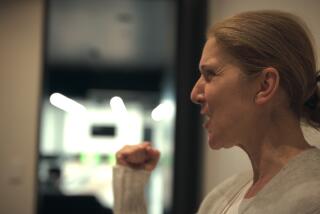Films can show the people behind the disabilities
- Share via
I wonder if The Times’ apparent lack of interest in covering the recent Perspectives Film Festival (June 4 to 6 at the ArcLight Cinemas) was a matter of logistics or rather a reflection of the paper’s belief that its readers are simply not interested in films that deal with disabled characters.
Maybe there aren’t many disabled subscribers. Maybe they aren’t considered a legitimate movie audience bloc. Maybe the mention of developmental disabilities just makes people uncomfortable. I don’t know. With Perspectives, the Lanterman Regional Center and the American Film Institute have undertaken screening films that promote understanding and inclusion of people with developmental disabilities. But what does this really mean to me or to other readers of The Times?
The beauty of Perspectives for me, as a longtime movie lover and as a parent of a 2-year-old son with cerebral palsy, was that the experience of seeing a film became uniquely, spectacularly relevant. Though many of the films included in the festival were very much “disability stories,” others were simply compelling tales that featured a developmentally disabled supporting character. And really, apart from “Sling Blade” and “I Am Sam,” what films in recent memory have even featured a character with a disability, let alone a disabled actor?
In the two years since our son’s birth, my husband and I have heard a number of questions about cerebral palsy as well as no questions at all, which may suggest that people don’t know what to say or that they’re afraid of betraying their own ignorance. Though I sometimes get tired of explaining why Luke wears glasses, why he still doesn’t talk, why he needs seven therapies a week and that, no, he cannot crawl or walk, I still long for others to have a window into our lives and into the boy behind the diagnosis. But it is more than just a hunger for accurate depictions of people with special needs on film; it is a search for belonging, a search for understanding. Will my son have to necessarily bridge two cultures to be successful? Why can’t other people learn more about Luke’s “culture” instead?
Films have a remarkable power to transform and to make immediate, to enlighten. I suppose I should be satisfied that I can direct people to “My Left Foot” or “Door to Door” to explain something about Luke. But I’m not. I want to see more films in which a developmentally disabled character is allowed the full complexity of other film characters. Where he or she is not just represented in one dimension as a profile in courage or as a victim but is instead just living with a developmental disability: feeling love, being funny, having sex, being a parent, negotiating the day-to-day struggles the rest of us contend with. Why should this be so radical a proposition?
I recall once talking to a deaf woman about advertising; she explained that most deaf people don’t read advertisements the same way that hearing people do: “It’s not meant for us.” Only now, years later, do I truly understand what she meant. I read articles about child development, about parenting; I see television shows and movies and much of the time a part of me tunes out: It’s not meant for me, it’s not meant for Luke, it doesn’t relate to a parent of a child with a brain injury.
But why should this matter to the Los Angeles Times or, for that matter, to the major film studios? Because people with cerebral palsy, autism, epilepsy, Down syndrome and mental retardation are everywhere, and they have as much a right to be portrayed accurately and dynamically in the media as does anyone else. And because they, like Luke, may have parents, aunts and uncles, brothers and sisters, friends and colleagues who see movies and buy newspapers and who care very much about how their stories are told. My hope for my son is that he can grow up with the knowledge that he is a valued member of society. But that hope hinges on society’s capacity and willingness to understand him and his unique abilities and gifts.
Kelly Vencill Sanchez is a Pasadena-based freelance writer and editor.
More to Read
Only good movies
Get the Indie Focus newsletter, Mark Olsen's weekly guide to the world of cinema.
You may occasionally receive promotional content from the Los Angeles Times.






